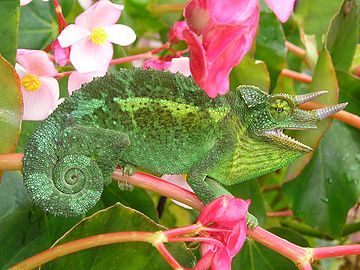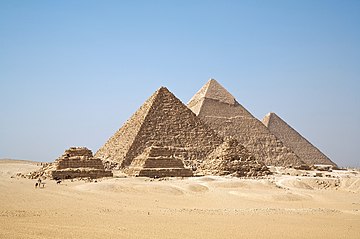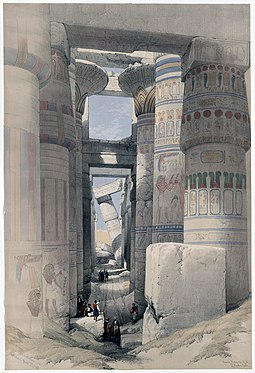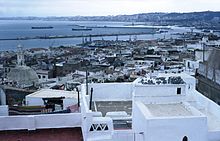Portal:Africa



Africa is the world's second-largest and second-most populous continent after Asia. At about 30.3 million km2 (11.7 million square miles) including adjacent islands, it covers 20% of Earth's land area and 6% of its total surface area. With nearly 1.4 billion people as of 2021, it accounts for about 18% of the world's human population. Africa's population is the youngest among all the continents; the median age in 2012 was 19.7, when the worldwide median age was 30.4. Based on 2024 projections, Africa's population will reach 3.8 billion people by 2099. Africa is the least wealthy continent per capita and second-least wealthy by total wealth, ahead of Oceania. Scholars have attributed this to different factors including geography, climate, corruption, colonialism, the Cold War, and neocolonialism. Despite this low concentration of wealth, recent economic expansion and a large and young population make Africa an important economic market in the broader global context. Africa has a large quantity of natural resources and food resources, including diamonds, sugar, salt, gold, iron, cobalt, uranium, copper, bauxite, silver, petroleum, natural gas, cocoa beans, and.
Africa straddles the equator and the prime meridian. It is the only continent to stretch from the northern temperate to the southern temperate zones. The majority of the continent and its countries are in the Northern Hemisphere, with a substantial portion and a number of countries in the Southern Hemisphere. Most of the continent lies in the tropics, except for a large part of Western Sahara, Algeria, Libya and Egypt, the northern tip of Mauritania, and the entire territories of Morocco, Ceuta, Melilla, and Tunisia, which in turn are located above the tropic of Cancer, in the northern temperate zone. In the other extreme of the continent, southern Namibia, southern Botswana, great parts of South Africa, the entire territories of Lesotho and Eswatini and the southern tips of Mozambique and Madagascar are located below the tropic of Capricorn, in the southern temperate zone.
Africa is highly biodiverse; it is the continent with the largest number of megafauna species, as it was least affected by the extinction of the Pleistocene megafauna. However, Africa also is heavily affected by a wide range of environmental issues, including desertification, deforestation, water scarcity, and pollution. These entrenched environmental concerns are expected to worsen as climate change impacts Africa. The UN Intergovernmental Panel on Climate Change has identified Africa as the continent most vulnerable to climate change.
The history of Africa is long, complex, and varied, and has often been under-appreciated by the global historical community. In African societies the oral word is revered, and they have generally recorded their history via oral tradition, which has led anthropologists to term them oral civilisations, contrasted with literate civilisations which pride the written word. During the colonial period, oral sources were deprecated by European historians, which gave them the impression Africa had no recorded history. African historiography became organized at the academic level in the mid-20th century, and saw a movement towards utilising oral sources in a multidisciplinary approach, culminating in the General History of Africa, edited by specialists from across the continent. (Full article...)
Selected article –
The Kingdom of Kongo (Kongo: Kongo Dya Ntotila or Wene wa Kongo; Portuguese: Reino do Congo) was a kingdom in Central Africa. It was located in present-day northern Angola, the western portion of the Democratic Republic of the Congo, Southern of Gabon and the Republic of the Congo. At its greatest extent it reached from the Atlantic Ocean in the west to the Kwango River in the east, and from the Congo River in the north to the Kwanza River in the south. The kingdom consisted of several core provinces ruled by the Manikongo, the Portuguese version of the Kongo title Mwene Kongo, meaning "lord or ruler of the Kongo kingdom", but its sphere of influence extended to neighbouring kingdoms, such as Ngoyo, Kakongo, Loango, Ndongo, and Matamba, the latter two located in what is Angola today.
From c. 1390 to 1862, it was an independent state. From 1862 to 1914, it functioned intermittently as a vassal state of the Kingdom of Portugal. In 1914, following the Portuguese suppression of a Kongo revolt, Portugal abolished the titular monarchy. The title of King of Kongo was restored from 1915 until 1975, as an honorific without real power. The remaining territories of the kingdom were assimilated into the colonies of Portuguese Angola, the Belgian Congo, and the Republic of Cabinda, respectively. The modern-day Bundu dia Kongo sect favours reviving the kingdom through secession from Angola, the Republic of the Congo, and the Democratic Republic of the Congo. (Full article...)
Featured pictures –
Did you know (auto-generated) -

- ... that land for a library built for African Americans in Virginia was donated by Pope Pius XII?
- ... that in 2022, Four Hundred Souls: A Community History of African America was a finalist for both an Andrew Carnegie Medal for Excellence in Nonfiction and an Audie Award for Multi-voiced Performance?
- ... that the book Love Falls On Us, about the LGBTQ movement in Africa, was praised by author Uzodinma Iweala for "elevating the extraordinary ordinariness of L.G.B.T.Q. Africans"?
- ... that in 1888, Edward P. Duplex became the first African American to be elected a mayor in California?
- ... that the growth of Christianity in 20th-century Africa has been termed the "fourth great age of Christian expansion"?
- ... that Albert Luthuli was the first African to win the Nobel Peace Prize?
Categories
Selected biography –
Gamal Abdel Nasser Hussein (15 January 1918 – 28 September 1970) was an Egyptian military officer and politician who served as the second president of Egypt from 1954 until his death in 1970. Nasser led the Egyptian revolution of 1952 and introduced far-reaching land reforms the following year. Following a 1954 attempt on his life by a Muslim Brotherhood member, he cracked down on the organization, put President Mohamed Naguib under house arrest and assumed executive office. He was formally elected president in June 1956.
Nasser's popularity in Egypt and the Arab world skyrocketed after his nationalization of the Suez Canal Company and his political victory in the subsequent Suez Crisis, known in Egypt as the Tripartite Aggression. Calls for pan-Arab unity under his leadership increased, culminating with the formation of the United Arab Republic with Syria from 1958 to 1961. In 1962, Nasser began a series of major socialist measures and modernization reforms in Egypt. Despite setbacks to his pan-Arabist cause, by 1963 Nasser's supporters gained power in several Arab countries, but he became embroiled in the North Yemen Civil War, and eventually the much larger Arab Cold War. He began his second presidential term in March 1965 after his political opponents were banned from running. Following Egypt's defeat by Israel in the Six-Day War of 1967, Nasser resigned, but he returned to office after popular demonstrations called for his reinstatement. By 1968, Nasser had appointed himself prime minister, launched the War of Attrition to regain the Israeli-occupied Sinai Peninsula, began a process of depoliticizing the military, and issued a set of political liberalization reforms. After the conclusion of the 1970 Arab League summit, Nasser suffered a heart attack and died. His funeral in Cairo drew five to six million mourners, and prompted an outpouring of grief across the Arab world. (Full article...)
Selected country –
 |
 |
||
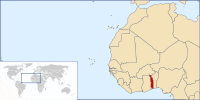
| |||
Togo, or the Togolese Republic, is a country in West Africa bordering Ghana in the west, Benin in the east, Burkina Faso in the north, and the Gulf of Guinea in the south, where the capital Lomé is located.
Togo's small sub-Saharan economy is heavily dependent on both commercial and subsistence agriculture, which provides employment for 65% of the labor force. Cocoa, coffee, and cotton together generate about 30% of export earnings. Togo is self-sufficient in basic foodgoods when harvests are normal, with occasional regional supply difficulties. In the industrial sector, phosphate mining is by far the most important activity, although it has suffered from the collapse of world phosphate prices and increased foreign competition.
Togo's culture reflects the influences of its 37 ethnic groups, the largest and most influential of which are the Ewe, Mina[disambiguation needed], and Kabre. Despite the influences of Christianity and Islam, over half of the population follow native animistic practices and beliefs. French is the official language. (Read more...)
Selected city –
Algiers (/ælˈdʒɪərz/ al-JEERZ; Arabic: الجزائر, romanized: al-Jazāʾir) is the administrative, political and economic capital and largest city of Algeria as well as the capital of the Algiers Province. The city's population at the 2008 census was 2,988,145 and in 2020 was estimated to be around 4,500,000. Located in the north-central part of the country, it extends along the shores of the Bay of Algiers in the heart of the Maghreb region making it classified among the biggest cities in North Africa, the Arab world and the Mediterranean Sea, making it a major center of culture, arts, gastronomy and trade.
The city contains the largest infrastructure facilities in the country; railway and highway connections with neighbouring cities and international links via the Houari Boumediene Airport and Algiers Ferry Terminal. Algiers possesses notable mass transit options, that includes the Algiers Metro, the city's subway system that recorded about 46 million passengers in 2023, alongside the Algiers tramway and several Gondola lift lines helping with the difference in elevation, in addition to many bus lines connecting the suburbs and major population centers. (Full article...)
In the news
- 12 February 2024 –
- Two boats collide on the Congo River near Kinshasa, Democratic Republic of the Congo; with the death toll remains unclear. (AP)
- 11 February 2024 – 2023 Africa Cup of Nations
- In association football, hosts Ivory Coast win their third Africa Cup of Nations by defeating Nigeria 2–1 in the final. Sébastien Haller scores the winning goal in the 81st minute. (The Guardian)
- 10 February 2024 – Somali civil war
- Four Emirati soldiers and a Bahraini military officer are killed, while ten other people are injured, when a soldier opens fire at a military base in Mogadishu, Somalia, before being killed in the ensuing shootout. Al-Shabaab claims responsibility. (AP)
- 10 February 2024 –
- A Eurocopter EC130 helicopter crashes near Nipton, California, United States, killing all the six people on board, including Nigerian banker Herbert Wigwe. (CBS News)
- 10 February 2024 – 2023–2024 Senegalese protests
- Violent protests occur in Senegal following an announcement by President Macky Sall that presidential elections have been delayed from February 25 to December 15. (Sky News)
- 9 February 2024 –
- At least 18 people are killed during a collision between a bus and a truck on a road in Kinshasa, Democratic Republic of the Congo. (AP)
Updated: 16:33, 14 February 2024
General images -
Africa topics
More did you know –
- ...that Rukwanzi Island, an island in Lake Albert, one of the African Great Lakes, is the subject of a territorial dispute between the Democratic Republic of the Congo and Uganda?
- ...that Oumarou Sidikou, vice-governor of the Central Bank of West African States from 1988 to 1993, was a minister in the government of Nigerien Prime Minister Hama Amadou, which was ousted by a military coup in 1996?
- ...that Jason Dunford, an All-Africa Games gold medalist and runner-up for the 2006 Kenyan Sportsman of the Year award, has a younger brother who was selected "most promising sportsman" at the same awards?
- ...that Sam Mbakwe, governor of Imo State from 1979 to 1983, served in the army of the Republic of Biafra, an Igbo secessionist state in southeastern Nigeria, during the Nigerian Civil War?
Related portals
Major Religions in Africa
North Africa
West Africa
Central Africa
East Africa
Southern Africa
Associated Wikimedia
The following Wikimedia Foundation sister projects provide more on this subject:
-
Commons
Free media repository -
Wikibooks
Free textbooks and manuals -
Wikidata
Free knowledge base -
Wikinews
Free-content news -
Wikiquote
Collection of quotations -
Wikisource
Free-content library -
Wikispecies
Directory of species -
Wikiversity
Free learning tools -
Wikivoyage
Free travel guide -
Wiktionary
Dictionary and thesaurus



